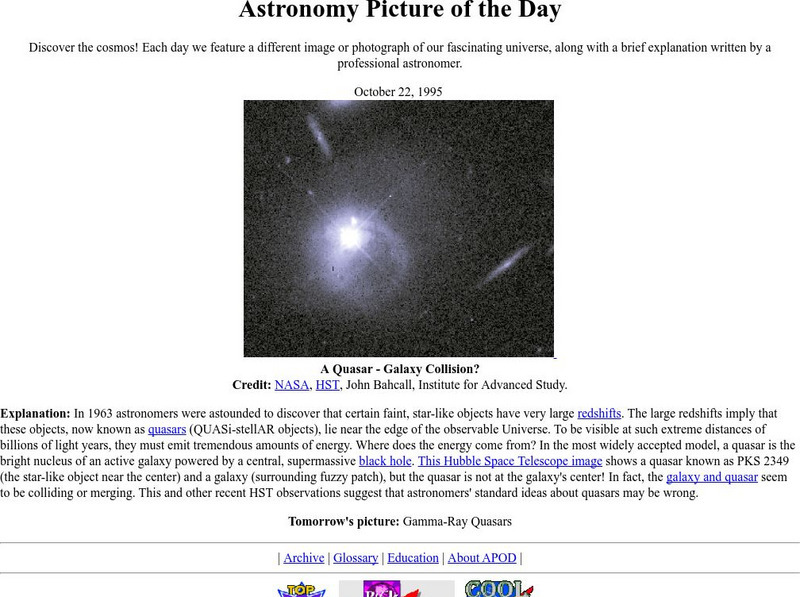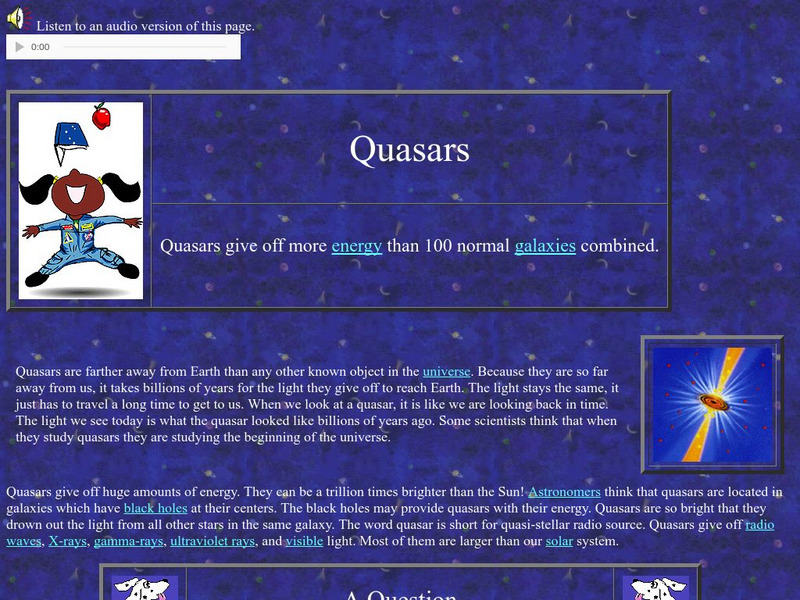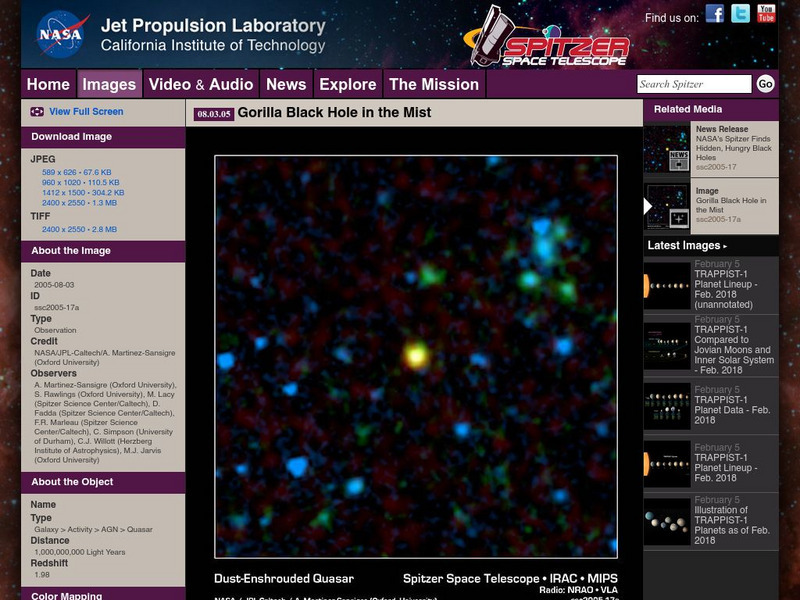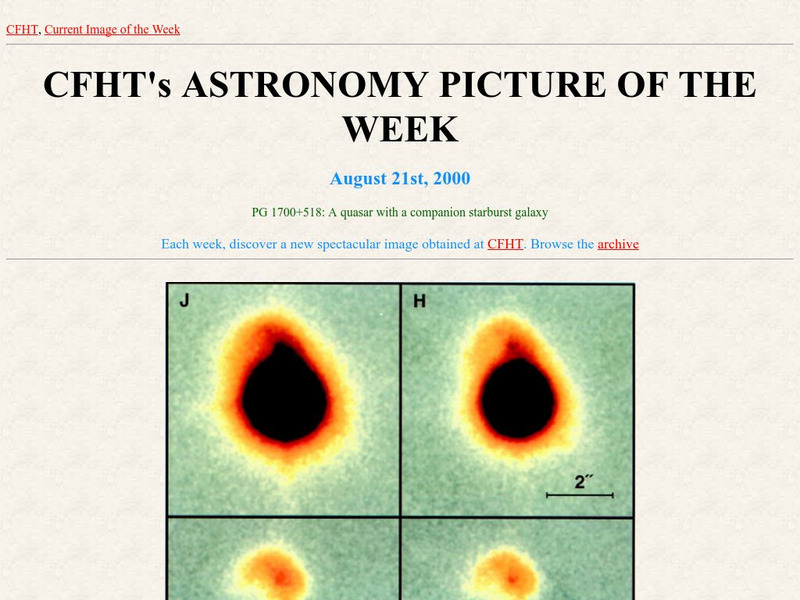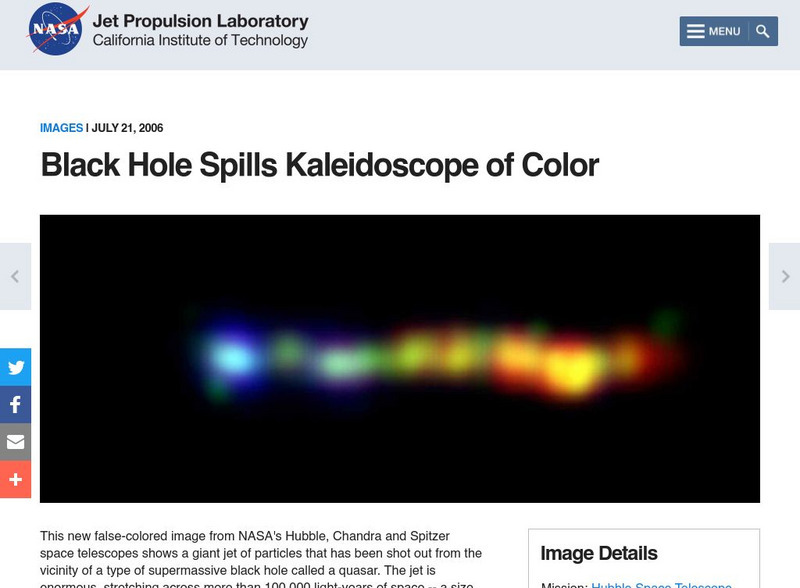Curated OER
Black Holes
The images in this PowerPoint are really appealing and there are some definitions. However, the information is incomplete, so you would have to either add explanations or use this purely for review. Different types of galaxies are...
Curated OER
Galaxies and Stars Scavenger Hunt
For this space worksheet, learners identify and describe what auroras are in the sky and why they are made up of different colors. Then they explain why stars are born and what happens to them as they get older. Students also name which...
Curated OER
Astronomy 30-3 Word Search
In this science learning exercise, students locate and identify various vocabulary terms related to space science. There are 13 words/phrases located in the puzzle.
NASA
Nasa: Astronomy Picture of the Day: Gamma Ray Quasar
A photograph and description of quasar 3C279 viewed in gamma-rays. It was unexpectedly discovered and was one of the brightest objects in the gamma-ray sky until it suddenly faded.
NASA
Nasa: Astronomy Picture of the Day: A Milestone Quasar
An image of a typical quasar and a star. An explanation written by a professional astronomer is included. There are also many embedded links within the text to related topics.
NASA
Astronomy Picture of the Day: Quasar Galaxy Collision
An image of a quasar. The large redshifts imply that quasars lie near the edge of the observable universe and must emit tremendous amounts of energy. There are also many embedded links to related topics.
Georgia Department of Education
Ga Virtual Learning: Galaxies, the Milky Way and Beyond
In this interactive tutorial students will explore galaxies. Learn what the Milky Way Galaxy is like, how various galaxies are grouped into clusters and superclusters and why those particular galaxies clump together.
NASA
Nasa: Imagine the Universe: Fa Qs on Quasars
A list of answers to many questions related to quasars and active galaxies.
NASA
Nasa Star Child: Quasars (Level 2) Information
NASA presents the amount of energy, type of energy, brightness, and the detection of quasars. Provides several examples, pictures, and information.
Virginia Tech
Virginia Tech: Frequently Asked Questions About Quasars
This site from Virginia Tech provides answers to a list of questions about quasars.
National High Magnetic Field Laboratory
Magnet Academy: Timeline of Electricity and Magnetism: 1960 1979
Computers evolve into PCs, researchers discover one new subatomic particle after another and the space age gives our psyches and science a new context.
NASA
Nasa Star Child: Quasars (Level 1)
Learn why quasars are the brightest things in the universe. Vocabulary words linked to a glossary of terms and a printable version are available.
NASA
Nasa Star Child: Comets (Level 1)
Younger students learn why comets race through the sky as well as related vocabulary words and meanings.
Harvard University
Quasars and Active Galaxies
This site provides information about quasars and active galaxies. Includes a glossary of important terms.
NASA
Viewing the Violent Universe: What Are Gamma Rays?
The universe produces a broad range of light, only a fraction of which is visible to our eyes. Gamma rays are nonvisible light, which also includes x-rays, ultraviolet light, infrared radiation, and radio waves.
California Institute of Technology
Spitzer Science Center: Gorilla Black Hole in the Mist
The Gorilla Black Hole in the Mist image features a distant galaxy with a quasar and a super-massive black hole. In addition, a detailed textual overview explains various specifics of the picture.
University of Hawai'i
University of Hawaii Cfht: Quasars
Provides basic information related to quasars.
PBS
Pbs: Discovery of Quasars 1960
PBS offers a brief history of the discovery of quasars and the people involved.
NASA
Nasa: Black Hole Spills Color
Under the heading, "Black Hole Spills Kaleidoscope of Color" this site examines specific details of an image displaying the "supermassive black hole called a quasar."







